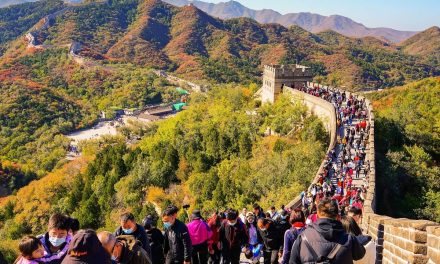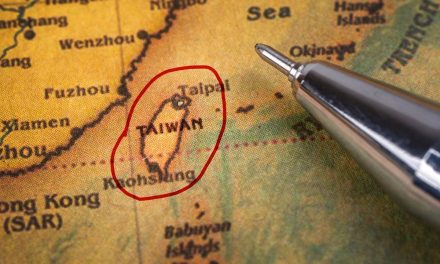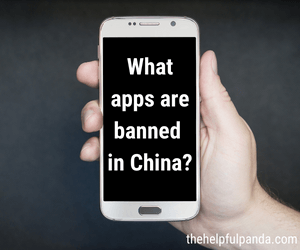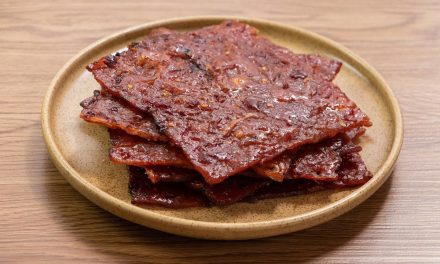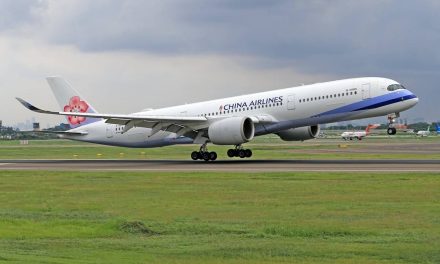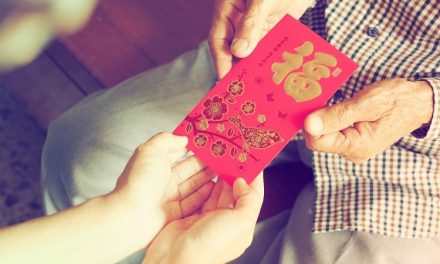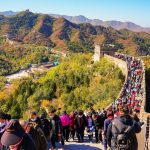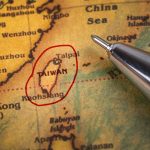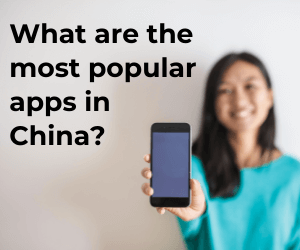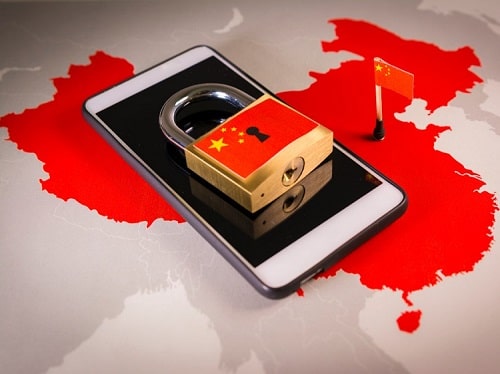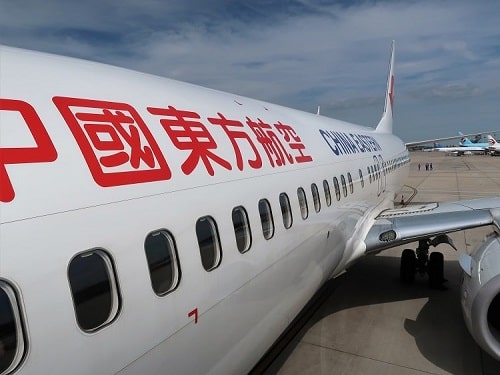Brush up on your Chinese history with all the key events over the past 74 years.
China is an ancient land that dates back centuries.
But when the Qing Dynasty ended in 1912, a new era of modern Chinese history began.
Following a civil war, Mao Zedong united the country and proclaimed the People’s Republic of China on October 1, 1949.
There have been many twists and turns since then, which have shaped the China we know today.
Year by year, I’ve summarized all the key events to help you better understand what’s gone on. I’ve also included some unusual facts along the way, to keep you on your toes!
So, fasten your seatbelts and join me on a whistle-stop tour of China’s recent history.
Founding of the PRC and the early years (1949–1954)

1949
Chinese Communist Party leader, Mao Zedong, officially proclaimed the People’s Republic of China (PRC) on October 1.
This followed a civil war with the Nationalists, who fled to Taiwan.
1950
Countries around the world start to recognize the new PRC government.
The United Kingdom even broke diplomatic ties with Taiwan (known as the Republic of China or ROC) in order to follow suit.
1951
The Chinese Spring Offensive, an operation lead by the Chinese People’s Volunteer Army to drive UN forces from the Korean peninsula, took place in the summer of ’51.
1952
A reform movement known as the Five-Anti Campaign was an all-out effort from Mao and his government to rid modern China of corruption and enemies of the state.
Aimed towards capitalists, some refer to it as a war against the bourgeoisie in China. The five antis – which were enforced arbitrarily – were:
- Bribery
- Theft of state property
- Tax evasion
- Cheating on government contracts
- Stealing state economic intelligence.
1953
The Korean War, resulting in the deaths of hundreds of thousands of Chinese soldiers, ended in 1953. This was also the year that the future leader of China, Xi Jinping, was born. More on him later.
1954
The year was a monumental moment in Chinese political history as it saw the 1st National People’s Congress (NPC) begin its inaugural session.
Plots, pandemics and forward planning (1955–1959)

1955
A dramatic failed assassination took place in 1955 when Premier Zhou Enlai was due to fly from Hong Kong to Jakarta on Air India Flight 300.
For one reason or another (many have speculated here), Zhou missed the flight which subsequently went on to crash into the South China Sea after a mid-air explosion.
Sixteen of the nineteen people on board perished and the incident is now known as the Kashmir Princess.
It’s believed that Zhou was the intended target of the attack and that the Kuomintang (the Nationalist Party) were responsible for it.
1956
In more upbeat news, Shanghai Natural History Museum was established in 1956. It has since moved to a new, more modern location in Jing’an Sculpture Park in 2015.
(Of course, there’s absolutely no shortage of things to do in Shanghai as this travel guide will tell you.)
1957
Good times never last too long though, do they? The year 1957 welcomed a new strain of influenza with the first cases reported in Guizhou, Southern China.
The outbreak soon became a pandemic. It’s estimated to have resulted in up to 4 million deaths worldwide, with up to 2 million of them in China and Hong Kong alone.
1958
Not a nation to ever be held back, modern China pushed on with its Great Leap Forward in 1958.
This is sometimes referred to as the Second Five-Year Plan and really endeavored to help the country progress from an agrarian (farming) society into a fully fledged communist society.
Pinyin officially replaced all other romanization methods in China, revolutionizing Chinese language learning.
1959
In 1959, Mao Zedong was replaced as Chairman of the PRC. Liu Shaoqi took over.
Don’t worry though, Uncle Mao (as some affectionately call him) was still chairman of the Communist Party of China and you’ll hear a lot more about him as we go on.
Swinging into the sixties (1960–1964)

1960
At this point in time, the Chinese nation was in the midst of its Great Famine. To show solidarity with those suffering, Mao decided not to eat meat for around seven months.
1961
China hosted the World Table Tennis Championships for the first time in 1961.
The country currently sits at the top of the all-time medal table for the sport with over 400 medals! (To give you some perspective, second place only has 200 medals.)
As you might be able to tell, table tennis is incredibly popular in China, but so are these other sports.
1962
The country had tried to eradicate four ‘pests’ thought to carry diseases:
- Rats
- Flies
- Mosquitoes
- Sparrows.
The Four Pests Campaign ended in 1962.
Sparrows were later removed from the list and replaced with bedbugs. Can’t say I disagree with that one!
Ultimately, the four-year-long campaign was quite the flop. It caused ecological imbalance and many believed it was a contributing factor in the nationwide famine which still had the nation in a chokehold.
1963
In September of 1963, Time Magazine ran a cover piece titled Red China: The Arrogant Outcast. Yikes.
The same year, the Sino-Pakistan Agreement was reached, establishing borders in the previously disputed Kashmir region.
1964
Project 596, the first nuclear weapons test conducted by the People’s Republic of China, took place in 1964.
This test made China the world’s fifth nuclear power and the first Asian nation with nuclear capabilities.
Culture wars (1965–1969)

1965
During a 40-day trip to China in 1965, Japanese photographer Koichi Saito took more than 3,000 photographs documenting the life of ordinary people during the height of Mao’s popularity.
Saito’s pictures are a fascinating glimpse into a China of the past.
1966
Launched by Chairman Mao, the Cultural Revolution began with the ultimate goal of preserving Chinese communism in modern society.
Millions of Chinese intellectuals and teachers were publicly humiliated, beaten, and killed.
1967
Another dark period in Chinese history, which resulted in the deaths of over 9,000 people while a further 2,000 people were permanently injured.
These individuals, labelled as “class enemies”, belonged to one of the five black categories:
- Landlords
- Rich farmers
- Counter-revolutionaries
- Bad influences
- Right-wingers.
Today, this tragic slaughter is known as the Daoxian Massacre.
1968
The following year, a mango cult was somewhat unintentionally established.
The foreign minister of Pakistan gifted Mao a box of mangoes in August of ’68. Mao then gave the fruit to a propaganda group at Tsinghua University.
The mangoes in question became symbolic of Mao’s affection for the people and were preserved instead of being eaten. Cue a huge demand for wax mangoes and mango flavored or scented products.
Those who had anything negative to say about the fruit were severely punished.
Dentist, Dr. Han, was executed for malicious slander after suggesting that mangoes were not special and in fact looked like sweet potatoes.
Look what happens when you re-gift!
1969
Do you remember Liu Shaoqi from earlier? Mao’s successor.
Things weren’t going so well for him. In 1969, at the 9th National Congress, he was declared to be an enemy and traitor. He died later that year in prison.
To cut a long story short, Liu and Mao had a bit of beef going on. Ultimately, Mao was much more popular and much more powerful.
U.S. relations and hidden gems (1970–1974)

1970
China became the fifth country in the world to independently and successfully launch a satellite into space.
The satellite was called Dong Fang Hong 1. This roughly translates to The East is Red in English.
1971
In 1971, Lin Biao died in a plane crash.
Who is he and why is he significant?
From 1959, he simultaneously held the roles of Vice Premier of the People’s Republic of China, Vice Chairman of the Chinese Communist Party and Minister of National Defense.
You could say that he was quite an important guy.
It’s alleged that Lin had planned to assassinate Mao. He supposedly then intended to defect to the Soviet Union.
His attempts had all been foiled, but Mao was definitely onto him.
The official word is that Lin’s aircraft ran out of fuel killing all nine individuals on board when it crashed down in Mongolia.
1972
The year saw Richard Nixon become the first US president to visit mainland China while in office. He stopped off in Beijing, Shanghai and Hangzhou.
1973
Speaking of the US…
In 1973, Mao is said to have offered to send 10 million Chinese women to the US during a conversation with US envoy Henry Kissinger. Mao believed this move would kick-start trade between the two nations but warned of a harmful population boom.
It seems like it was an interesting conversation, to say the least.
1974
Farmer Yang Zhifa struck gold, well clay, in 1974 when he discovered the Mausoleum of the First Qin Emperor while digging a well.
The terracotta warriors are definitely one of the most incredible sites I’ve visited here in China. The nearby city of Xi’an has a lot to offer too!
Farewell to a national treasure (1975–1979)

1975
The Fourth National People’s Congress was held during which a new constitution was approved and the State Council was reshuffled a little.
1976
Mao Zedong passed away on September 9, 1976. He was 82 years old.
Mao married four times throughout his life and fathered 10 children. His legacy, be it good or bad, is one that will be discussed for decades, if not centuries to come.
1977
The Beijing Symphony Orchestra was founded in 1977.
These days, the company puts on around 80 concerts each year, providing a soundtrack for moments such as the Lunar New Year and events such as the Olympic Games.
They’ve even performed on the Great Wall of China!
1978
The country officially opened up to the rest of the world.
Years later, leader Deng Xiaoping would be heralded for China’s economic and social reforms, and allowing some Western cultures to influence China’s new ways.
On December 15, 1978, U.S. President Jimmy Carter announced that the United States will formally recognize the communist People’s Republic of China.
1979
September 1979 saw a group of self-taught, avant-garde artists host an illegal exhibition on the railings of the China Art Gallery after being refused exhibition space inside.
As the country formerly banned the western styles of art displayed, the exhibition was soon shut down by police.
Thankfully, later that same year, the first official Star Art Exhibition took place legally in Beijing’s Beihai Park.
One-child policy and the first billion (1980–1984)

1980
The start of the eighties brought with it the implementation of China’s controversial One Child Policy.
Attempts had been made to control the population prior to 1980. But September of this year is noted as the official start date of the policy, which would go on to last until 2016!
1981
The first Golden Rooster Awards took place in 1981. The now bi-yearly ceremony celebrates and honors the best domestic films.
Until fairly recently, nominees had to be from mainland China, but now the acting categories are also open to performers from Hong Kong and Taiwan.
Overall, I suppose it’s not too dissimilar to a Chinese version of the Academy Awards.
1982
China became the first country to reach a population of one billion people.
1983
Former professional tennis player, Hu Na, defected from the PRC and was granted diplomatic asylum in the United States in 1983.
Diplomatic relations between the two nations had not long been established and this incident definitely tested the strength of that new bond.
1984
Pandas are synonymous with China. In fact, the country used to gift the cuddly black and white icon to other nations.
But in 1984, the policy was modified and pandas were leased instead.
China kicked off this new wave of ‘panda diplomacy’ by presenting the US with pandas during the Los Angeles Olympic Games, for the small sum of $50,000 per panda per month.
Pop, pandas and Tiananmen (1985–1989)

1985
English musical duo Wham! made history in 1985 when they became the first western pop act to perform in China. Even today it isn’t very common to see international artists tour the mainland.
You can find out all about George Michael and Andrew Ridgely’s Chinese bizarre visit here.
1986
The late Queen Elizabeth II then became the first British monarch to visit the Middle Kingdom in 1986. Maybe she was inspired by Wham!
1987
This was an exciting year with the establishment of the Chengdu Research Base of Giant Panda Breeding.
And, Kanye West moved to China! His mother taught for one year at Nanjing University.
1988
The Winter Olympic Games in 1988 saw China win not a single medal. Zero. Zilch. Nada.
However, they did win 28 medals at that year’s Summer Games, proving that you do in fact win some and lose some.
1989
This decade sadly ends with 1989’s Tiananmen Square incident.
These student-led protests resulted in around 300 deaths according to official figures. However, some independent organizations put the actual death toll closer to 3,000 souls.
Golden arches and new ventures (1990–1994)

1990
China welcomed its first McDonald’s in 1990. The fast-food chain set up shop in Shenzhen, a southern Chinese city which borders Hong Kong.
If McDonald’s isn’t enough to convince you to visit, don’t worry because I’ve suggested plenty of other things to do in Shenzhen.
1991
Now, let’s hear it for the girls because the first FIFA Women’s World Cup took place in Guangdong in 1991.
1992
The United States’ Chinese Student Protection Act was signed into law in 1992.
The Act sought to offer permanent residence for Chinese nationals who had gone to the US between June 1989 and April 1990.
You can scroll back up to remind yourself of what was happening around that time.
1993
In 1993, the China National Space Administration was established and the first Shanghai International Film Festival took place.
1994
Then in ’94, construction began for the Three Gorges Dam on one of the world’s mightiest rivers, the Yangtze. When construction was complete, the structure was the world’s largest dam.
Gains and the Great Firewall (1995–1999)

1995
China hosted the World Weightlifting Championships for the first time. The event took place in Guangzhou and saw China win more medals than any other country.
Also in 1995, but further north in Beijing, the midnight bus to Fragrant Hills was found submerged in a dam with bodies inside.
On the night it went missing, one of the passengers told the authorities they had hopped off because they saw ghosts on the bus.
An unsolved mystery or urban legend? I’ll let you decide.
1996
Nongfu Spring was founded in 1996. The company sells bottled water with a distinctive red cap and its founder, Zhong Shan Shan, is one of China’s wealthiest citizens.
(You can read more about the most famous Chinese people here.)
1997
The former British colony of Hong Kong was officially handed over to China in 1997.
1998
The Great Firewall project started in 1998. This refers to the government’s regulation of the Chinese internet.
If you’re travelling to China, you can use a VPN to bypass these restrictions. Remember to download it before you arrive here. My favorite VPN is ExpressVPN because it’s one of the most reliable in China.
But there’s a handful of others which you can see here.
1999
Gaining even more geographic ground, Macau was transferred to China in 1999.
Now the Macau Special Administrative Region of the People’s Republic of China, the territory had been under Portuguese rule for around 400 years.
A new century (2000-2004)

2000
Mainland China sailed into a brand-new century with a hit movie and joint venture with Hong Kong, Taiwan and the USA.
This somewhat unlikely group project gave us the movie Crouching Tiger, Hidden Dragon.
(You can read up on the best movies about Chinese culture here.)
The title, which was produced in Mandarin, swept up at the award shows that year with four Oscars, four BAFTAS, and two Golden Globes, to name just a few.
However, when the film went on to win the Academy Award for Best Foreign Language Film, the gong was accredited to Taiwan.
Moving on!
2001
Sticking with wins, 2001 saw Beijing officially be announced as the host city for the 2008 Summer Olympics.
2002
The year 2002 took a bit of a sour turn when SARS was first detected in southern China’s Guangdong province.
It eventually spread to around 29 territories and countries worldwide and lead to upwards of 774 deaths internationally.
2003
The Three Gorges Dam finally began filling its reservoir.
2004
Shanghai had a somewhat positive 2004 when the One Child Policy was revised to allow divorced and remarried residents of the city to have a second child, without being penalized.
Tense relations and earthquake (2005–2009)

2005
Relationships with Japan soured in 2005 after a controversial Japanese history textbook was seen to be whitewashing the country’s involvement in several wars, including their treatment of the Chinese.
This sparked demonstrations in Beijing.
You might already know that protests of any sort are pretty much unheard of in China, so this was a big deal.
2006
The Qinghai-Tibet Railway, a picturesque stretch of track, was completed in 2006.
China’s rail network is vast and there are no shortage of scenic train journeys to enjoy. But this is an especially beautiful route to travel.
This year also saw Baidu (China’s answer to Google) set up shop.
2007
The Agricultural Bank of China’s robbery was a tale I stumbled upon by chance during a layover en route to China.
Check it out! It’s a fascinating story with a grizzly end.
2008
China’s most recent major earthquake occurred in Sichuan province in 2008. The 8.0 magnitude quake resulted in a death toll of around 87,587 people.
To date, this is in the top 20 most deadly earthquakes of all time.
China is no stranger to earthquakes, but thankfully most of them are not as severe as this one was.
2009
A thrown shoe threatened to impact China-UK relations in 2009 when a German national threw his footwear at Premier Wen Jiabao during a lecture at the University of Cambridge.
Let’s get technical (2010–2014)

2010
Chinese tech giant Xiaomi was founded in 2010.
Among the co-founders was the vice president of the Google China Institute of Engineering, the senior director of Motorola Beijing R&D Center, and a senior product manager also from Google China.
Make of that what you will.
The brand focuses on smartphone production, but has ventured into other electronic products as the years have gone by.
2011
The king of all Chinese apps, WeChat, was launched.
This app is used daily by over a billion people to keep in touch with friends and family, conduct business, pay bills, shop online, order taxis, translate texts, share media, read the news… the list of features is endless.
I can’t imagine how anybody survives in China without WeChat! (You can read about what it’s like moving to China here).
2012
China Central Television’s distinctive geometric arch-shaped headquarters finished being built in 2012 after 8 years of construction! I think that’s pretty slow by Chinese standards.
2013
China’s current ruler, Xi Jinping, assumed office as the 7th President of the People’s Republic of China in March of 2013. More of his shenanigans to come.
2014
Tragedy struck the nation when Beijing-bound Malaysia Airlines flight 370 went missing, with 153 of the 227 passengers onboard being Chinese citizens.
Netflix has an interesting documentary series about this devastating yet mysterious event, if you want to find out more.
Xi’s era begins (2015–2019)

2015
The Ma-Xi meeting of 2015 saw Xi Jinping meet Ma Ying-jeou (President of the Republic of China, aka Taiwan) in Singapore.
The moment was notable as politicians from each side had not met with one another since the end of the Chinese Civil War back in the 1950s.
(From politics to culture and everything in between, here are the main differences between Taiwan and China.)
2016
Mickey Mouse and Co arrived in mainland China when Shanghai Disneyland Park opened to the public that summer. Universal Studios wouldn’t arrive in China until 2021.
2017
The Chinese government begin to censor images of Winnie the Pooh. This was due to many internet users noticing a striking resemblance between the cartoon bear and Xi Jinping.
The memes and jokes that stemmed from this were deemed to be disrespectful and so the bear had to be stopped!
2018
Clearly very much enjoying his relatively new position of power, Xi opted to remove presidential term limits in 2018. Previously, leaders could not serve more than two consecutive terms.
2019
Chinese space mission Chang’e 4 completed the first successful landing on the dark side of the moon in 2019.
If they weren’t already, this definitely established China as a major player in space exploration, and more broadly as a global power.
To infinity and beyond (2020–)

2020
Wuhan was famously shut down as the COVID-19 pandemic started, and international relations took a hit.
Xi Jinping announced his goal of guiding the country to reach carbon neutrality by 2060.
With China currently being a top three consumer (and polluter) of coal, oil and gas, let’s see if that actually happens.
2021
A herd of 14 elephants gripped the nation as they undertook a 17-month journey across Yunnan province.
An emergency committee was set up to ensure their safety as they traveled 1,300 km (807 mi).
Millions of yuan was spent covering property damage caused by the animals and over 100,000 people had to be evacuated as the elephants wandered through cities without a care in the world.
Along the way, the herd ate entire fields of crops and truckloads of pineapples.
There’s just something about this story that I really love.
2022
Beijing became the first city to have hosted both the summer and winter Olympic Games. That means bragging rights for life!
That’s modern Chinese history until now
And 2023, here we are.
After a few tough years with strict pandemic restrictions, the country finally (and thankfully) reopened its borders and eased off on Covid rules.
This means that China is ready for Y-O-U! So what are you waiting for?
I hope you book a plane ticket and pack your suitcase soon.
If, even after all you’ve just read, you need more convincing to explore this amazing country then here are 21 fun facts about China today.
You could also keep learning about the past by reading these popular Chinese history books.
Main image credit: SW1994 on Pixabay.
FAQ about modern Chinese history
If you want to dig even deeper into China’s past, here’s some helpful information from the middle of the nineteenth century onwards.
What’s the Opium War?
It was a war between China and the UK from 1839 to 1841 regarding the opium trade in China. The UK won the war, allowing the opium trade to continue. Hong Kong was ceded to the British in 1841 as part of the negotiations.
What’s the May Fourth Movement?
It was a period of social and political reform that took place from 1917 to 1921. Student protests, which spread to workers across China, called for the government to not sign a treaty which would have otherwise awarded Shandong province to Japan, following World War I.
What role did Sun Yat-sen play in Chinese history?
Known as the father of modern China, Sun Yat-sen was the first president of the Republic of China after overthrowing the Qing Dynasty in 1912. He served as leader of the Chinese Nationalist Party (Kuomintang).
What’s the Sino-Japanese War?
This refers to two wars between China and Japan. The first Sino-Japanese Wear (1894–95) was a conflict between China and Japan over influence in Korea, which Japan won decisively. The second Sino-Japanese War (1937–45) saw millions of deaths and casualties, as Japan invaded and occupied swathes of eastern China. The Nanjing Massacre is the most infamous event during this period.
What was China’s role in World War II?
When WWII started, China already had a big fight on its hands. The Japanese Imperial Army invaded eastern China in 1937, about two years before WWII. The fighting continued until the Japanese surrender in 1945.
What was land reform in China?
It was a program of agrarian reform whereby land was taken away from rich landlords and given to peasant farmers. Communist leader Mao Zedong headed up the program after taking control of the country mid-last century.
Who are the most famous Chinese leaders in recent times?
Mao Zedong, Sun Yat-sen, Deng Xiaoping and Xi Jinping are some of the most famous Chinese leaders in recent times.
What are the key issues in modern Chinese history?
Key issues include struggles with outside forces (e.g. Sino-Japanese War), domestic instability (e.g. civil war between the Communists and Nationalists), as well as government programs such as the Great Leap Forward that had disastrous effects on the country.
Are there any good books on modern Chinese history?
Yes, you could try the Second Edition of Modern Chinese History which is published by Columbia University Press. It covers the period from 1644 to the current day.


